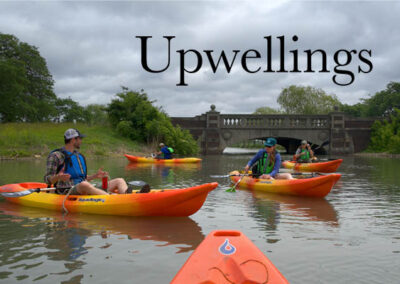
PhD student, Katrina Sky Munsterman, on a recent field trip to work with local fishing communities in Abaco, The Bahamas.
Research focuses on using ecosystem dynamics to help ensure sustainable fisheries
Katrina Munsterman, PhD student at the University of Michigan, Ann Arbor, recently became the recipient of a joint Sea Grant-NOAA Fisheries fellowship to pursue her work in ecosystem dynamics. Katrina applied via Michigan Sea Grant to receive this annual national award, the 2022 National Marine Fisheries Service (NMFS)-Sea Grant Joint Fellowship.
Katrina became involved in ecological research in her first year as an undergraduate at the University of California Santa Barbara; she is now pursuing her PhD at U-M and is working to understand how fish and fisher behavior affects production in coastal ecosystems.
NMFS has established her area of focus, essential fish habitat, as a priority research topic to rehabilitate fish stocks and maintain productive fisheries in the United States. Quality habitat is critical for fish recruitment and to reduce mortality from predators. Katrina’s research also highlights the role of fish in modifying their habitats by supplying nutrients from their waste, which alters primary production and can potentially increase fish populations.

Artificial reef built in a shallow seagrass ecosystem in The Bahamas. Long-term empirical data from these reefs will be used to parameterize the individual-based model.
Katrina’s proposed research will measure how these three processes – consumer-producer feedbacks, recruitment, and mortality – interact to control fish production on artificial reefs (ARs) in subtropical seagrass ecosystems. Specifically, she plans to develop an individual-based model (IBM) to measure multi-species fish production on ARs. The IBM framework allows for variation at the individual fish level to influence ecosystem-scale dynamics. During the fellowship, Katrina will work with NOAA fisheries biologist, Dr. Matthew Campbell, at the Southeast Fisheries Science Center.
Long-term, she hopes to develop tools to improve management of coastal fisheries by bridging the connection between scientists, managers, and fishers. Her goal is to learn how to respond to stakeholders’ needs to improve the tools necessary to effectively manage coastal fisheries.
Previously, she has worked with fishing communities to build and manage artificial reefs to rehabilitate failing fisheries and increase food security in Haiti and The Bahamas.
Since 1999, the NMFS-Sea Grant Joint Fellowship program has trained the next generation of experts in fisheries management. The program addresses the critical need for future fisheries scientists with expertise in stock assessment by supporting students pursuing doctoral degrees in related fields.

Reef fish and predators from subtropical coastal ecosystems, including multiple species of snapper and barracuda.
Fellows are chosen through a competitive process that involves national review by an expert panel. The 2022 fellows are geographically diverse, attending universities in Alaska, California, Florida, Michigan, Massachusetts, New York, North Carolina and Washington. Since the fellowship began, it has supported over 100 population and ecosystem dynamics and 38 marine resource economics doctoral fellows. Alumni of this fellowship typically hold future positions in NOAA Fisheries, other agencies, academics and fishery management councils.


